- Regulatory Status
- RUO
- Other Names
- Stromal cell-derived factor 1, chemokine (C-X-C motif) ligand 12, SCYB12, PBSF
- Ave. Rating
- Submit a Review
- Product Citations
- publications
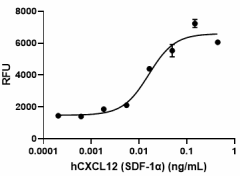
-

Recombinant Human CXCL12 chemoattracts Baf3-hCXCR4 transfectant cells in a dose-dependent manner with ED50 range of 0.015-0.12 ng/mL. -

Bioassay for human SDF-1
Human SDF-1 belongs to the CXCL chemokine family. The mouse cDNA SDF was initially cloned from a bone marrow stromal cell library, and the human was cloned from a pro-B-cell cDNA library. SDF is expressed by many organs, and it is most abundantly expressed in pancreas, spleen, ovary, and small intestine. SDF-1 (CXCL12) and its receptor CXCR4 are involved in regulation of migration, survival, and development of multiple cell types, including human hematopoietic CD34+/CD38-/low and stromal STRO-1+ stem cells. Stress-induced modulations in SDF-1 and CXCR4 levels participate in recruitment of immature and maturing leukocytes from the BM reservoir to damaged organs as part of host defense and repair mechanism. SDF-1 (CXCL12)/CXCR4 system is involved in the establishment of organ metastasis in different cancers, for example in lymph node metastasis in breast cancer and oral squamous cell carcinoma (SCC), and peritoneal metastasis in ovarian cancer. Recently, several studies have demonstrated the existence of a small subset of cancer cells which share many characteristics with stem cells and named cancer stem cells (CSC). They constitute a reservoir of self-sustaining cells with the ability to maintain the tumor growth. Most of them express CXCR4 receptor and respond to a chemotactic gradient of its specific ligand SDF-1, suggesting that CSC probably represent a subpopulation capable of initiating metastasis.
Product DetailsProduct Details
- Source
- Human SDF, amino acids Lys22-Lys89 (Accession # NM_199168) was expressed in E. coli.
- Molecular Mass
- The 68 amino acid recombinant protein has a predicted molecular mass of approximately 7963.4 Da. The DTT-reduced protein migrates at approximately 7kDa and the non-reduced protein migrates at approximately 9kDa by SDS-PAGE. The N-terminal amino acid is Lysine.
- Purity
- Purity is >98%, as determined by Coomassie stained SDS-PAGE.
- Formulation
- 0.22µm filtered protein solution is in 20mM Tris pH 8.0, 0.5M NaCl.
- Endotoxin Level
- Endotoxin level is <0.1 EU/µg (<0.01ng/µg) protein as determined by the LAL method.
- Concentration
- 10 and 25 µg sizes are bottled at 200 µg/mL. 100 µg size and larger sizes are lot-specific and bottled at the concentration indicated on the vial. To obtain lot-specific concentration and expiration, please enter the lot number in our Certificate of Analysis online tool.
- Storage & Handling
- Unopened vial can be stored between 2°C and 8°C for up to 2 weeks, at -20°C for up to six months, or at -70°C or colder until the expiration date. For maximum results, quick spin vial prior to opening. The protein can be aliquoted and stored at -20°C or colder. Stock solutions can also be prepared at 50 - 100 µg/mL in appropriate sterile buffer, carrier protein such as 0.2 - 1% BSA or HSA can be added when preparing the stock solution. Aliquots can be stored between 2°C and 8°C for up to one week and stored at -20°C or colder for up to 3 months. Avoid repeated freeze/thaw cycles.
- Activity
- Bioactivity was measured by its property to chemoattract resting human T cells in a dose-dependent manner. The ED50 is 80-120 ng/ml. Recombinant Human CXCL12 chemoattracts Baf3-hCXCR4 transfectant cells in a dose dependent manner with ED50 range of 0.015 – 0.12 ng/mL.
- Application
-
Bioassay
- Application Notes
-
BioLegend carrier-free recombinant proteins provided in liquid format are shipped on blue-ice. Our comparison testing data indicates that when handled and stored as recommended, the liquid format has equal or better stability and shelf-life compared to commercially available lyophilized proteins after reconstitution. Our liquid proteins are verified in-house to maintain activity after shipping on blue ice and are backed by our 100% satisfaction guarantee. If you have any concerns, contact us at tech@biolegend.com.
- Product Citations
-
Antigen Details
- Structure
- Chemokine
- Distribution
-
CXCL12 is expressed by intestinal epithelial cells, human brain microvessel endothelial cells (HBMEC), bone marrow stromal and epithelial cells
- Function
- CXCL12 is chemotactic for both peripheral blood T cells and lamina propia T cells. CXCL12 is chemotactic for peripheral blood B cells from healthy and RA donors. CXCL12 and its receptor are involved in the mobilization of CD34+ progenitors to the peripheral blood and the homing of stem cells to their specific niches. CXCL12-induced proliferation in pancreatic intraepithelial neoplasia cells (PanIN). CXCL12 is a constitutive chemokine involved in lung, brain, joint, brain, and intestine inflammation.
- Interaction
- SDF-1 binds to the CXCR4 expressed cells such as T lymphocytes, B cells monocytes, macrophages, tissue-committed stem/progenitor cells (TCSCs), mast cells, and vascular smooth muscle cells (VSMCs)
- Ligand/Receptor
- CXCR4
- Biology Area
- Apoptosis/Tumor Suppressors/Cell Death, Cell Biology, Immunology, Signal Transduction, Transcription Factors
- Molecular Family
- Cytokines/Chemokines
- Antigen References
-
1. Shirozu M, et al. 1995 Genomics 28:495-500.
2. Dar A, et al. 2006 Exp Hemathol 34:967-975.
3. Muller A, et al. 2001 Nature 410(6824):50-56.
4. Gelmini S, et al. 2008 J Endocrinol Invest 31:809-819.
5. Zlotnik A, et al. 2008 J Pathol 215:211-213. - Gene ID
- 6387 View all products for this Gene ID
- UniProt
- View information about CXCL12 on UniProt.org
Related FAQs
- Why choose BioLegend recombinant proteins?
-
• Each lot of product is quality-tested for bioactivity as indicated on the data sheet.
• Greater than 95% Purity or higher, tested on every lot of product.
• 100% Satisfaction Guarantee for quality performance, stability, and consistency.
• Ready-to-use liquid format saves time and reduces challenges associated with reconstitution.
• Bulk and customization available. Contact us.
• Learn more about our Recombinant Proteins. - How does the activity of your recombinant proteins compare to competitors?
-
We quality control each and every lot of recombinant protein. Not only do we check its bioactivity, but we also compare it against other commercially available recombinant proteins. We make sure each recombinant protein’s activity is at least as good as or better than the competition’s. In order to provide you with the best possible product, we ensure that our testing process is rigorous and thorough. If you’re curious and eager to make the switch to BioLegend recombinants, contact your sales representative today!
- What is the specific activity or ED50 of my recombinant protein?
-
The specific activity range of the protein is indicated on the product datasheets. Because the exact activity values on a per unit basis can largely fluctuate depending on a number of factors, including the nature of the assay, cell density, age of cells/passage number, culture media used, and end user technique, the specific activity is best defined as a range and we guarantee the specific activity of all our lots will be within the range indicated on the datasheet. Please note this only applies to recombinants labeled for use in bioassays. ELISA standard recombinant proteins are not recommended for bioassay usage as they are not tested for these applications.
- Have your recombinants been tested for stability?
-
Our testing shows that the recombinant proteins are able to withstand room temperature for a week without losing activity. In addition the recombinant proteins were also found to withstand four cycles of freeze and thaw without losing activity.
- Does specific activity of a recombinant protein vary between lots?
-
Specific activity will vary for each lot and for the type of experiment that is done to validate it, but all passed lots will have activity within the established ED50 range for the product and we guarantee that our products will have lot-to-lot consistency. Please conduct an experiment-specific validation to find the optimal ED50 for your system.
- How do you convert activity as an ED50 in ng/ml to a specific activity in Units/mg?
-
Use formula Specific activity (Units/mg) = 10^6/ ED50 (ng/mL)
 Login / Register
Login / Register 







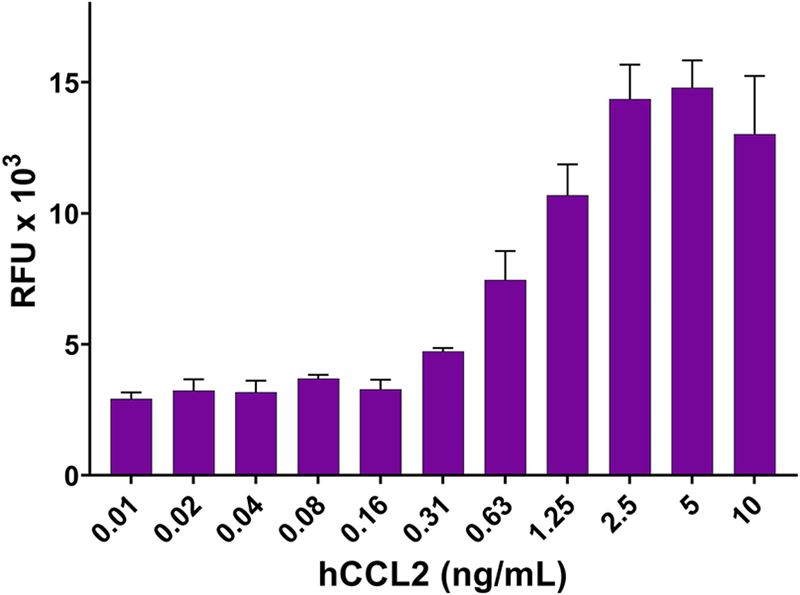
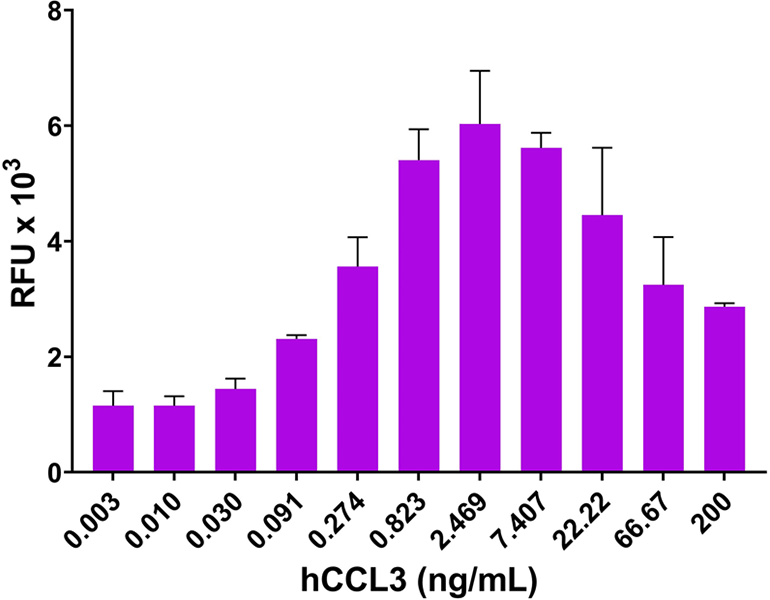
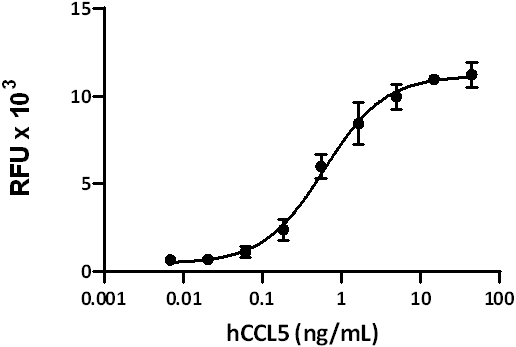
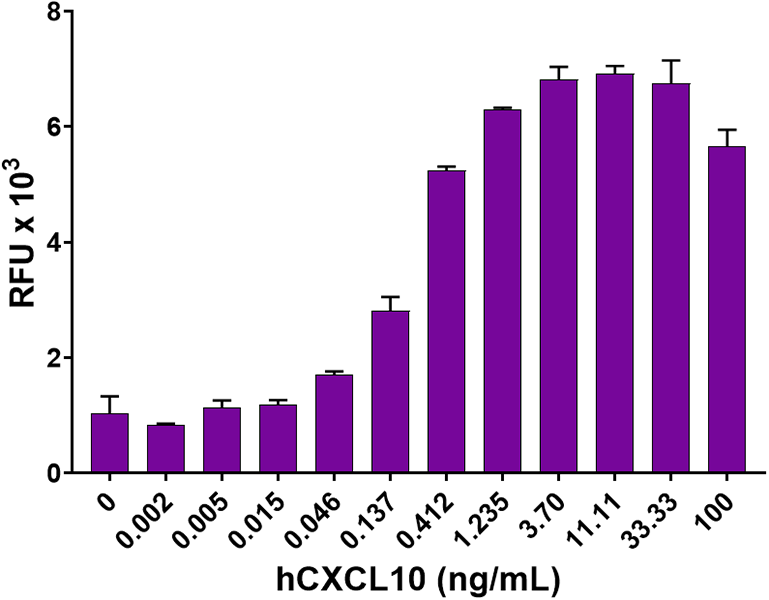



Follow Us